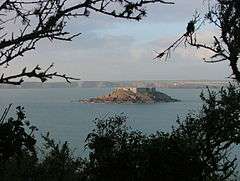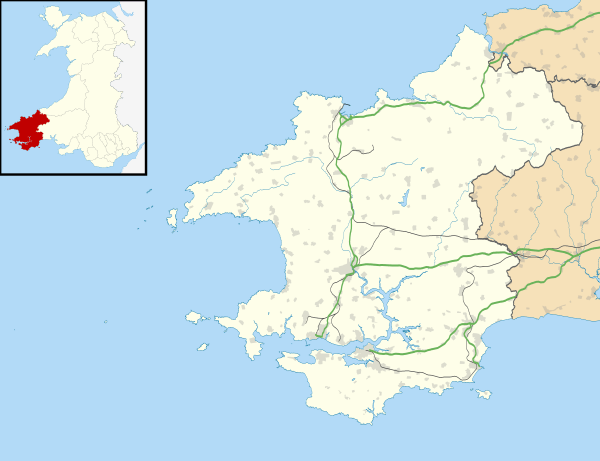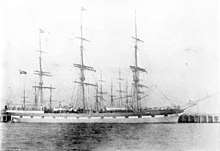Thorne Island
Thorne Island is a rocky islet and part of the community of Angle, Pembrokeshire, Wales, with an area of 2 acres (8,100 m2), dominated by a coastal artillery fort built to defend the Milford Haven Waterway in the mid-19th century. It has been the site of a number of shipwrecks, including one in 1894 that was carrying a cargo of Scotch whisky.
| Thorne Island | |
|---|---|
 | |
 Thorne Island Location within Pembrokeshire | |
| Community | |
| Principal area | |
| Country | Wales |
| Sovereign state | United Kingdom |
| Police | Dyfed-Powys |
| Fire | Mid and West Wales |
| Ambulance | Welsh |
History
Fortification
Thorne Island commands the entrance to the anchorage of Milford Haven and access to the former Royal Dockyard at Pembroke Dock. A proposal was made to fortify the island in 1817, but it was not implemented. In the 1850s, there was growing concern about the increasing strength of the French Navy and the expansionist policy of the Emperor Napoleon III.[1] Work started on the existing fort at some time after 1852 and a date of 1854 is carved above the entrance. The fort is an irregular polygon in plan and was designed with a seaward facing battery for five RBL 7 inch Armstrong guns and four 68-pounder guns, all mounted en barbette (i.e. in an open mounting, firing over a parapet). The landward side of the fort consists of a defensible barracks, with a loopholed parapet overlooking the entrance.[2]
In 1860, the report of the Royal Commission on the Defence of the United Kingdom commented that "Although these batteries [ie: Thorne Island Fort, Dale Fort and West Blockhouse Fort] would prevent an enemy from making use of the anchorage at the mouth of Milford Haven, they would not prevent the passage of steamers of war, and therefore would not suffice to protect the dockyard or the haven itself." This was due to the limited number and size of guns that the existing fort could bring to bear on any fast moving target.[3] The report recommended to Lord Palmerston that further forts should be strengthened or constructed to counter the potential threat of the French Navy. Eventually twelve forts were constructed around the entrance to Pembroke Dock and Milford Haven including Fort Hubberstone, Popton Fort and Stack Rock Fort.
20th century
The fort was converted into a hotel in 1947 and was sold in 1999 for £275,000.[4] In 2001 it was owned by the Von Essen hotel group who intended spending four million pounds to reopen the hotel with a five star rating and a cable car to allow access from the mainland. In 2001 a competition was successfully held to find a family who would serve as caretakers for a year.[5] The island was put up for sale again with a price tag now of £750,000.[6] The island was finally sold in November 2011 for 'significantly less' than the guide price.[7]
The fort became a Grade II* Listed Building in 1996, because it was "a well-preserved fort of Palmerston's Haven defences".[8]
Wrecks

Even without the fort, the island and the rocks around it were a hazard to any shipping. Divers recognise over twelve wrecks that are worth diving in the area of the island but of special interest is the sailing ship that sank in 1878.[9] people were rescued from the 1878 built sailing ship Loch Shiel which had run into rocks off the island. Two Angle lifeboat crew members and the honorary secretary received silver RNLI medals.[10]
The rescue is particularly noteworthy as it is described as Wales' "Whisky Galore". The Loch Shiel was carrying goods from Scotland to Adelaide and included gunpowder, beer[11] and 60[11] (some say 7,000[12]) cases of Glasgow whisky. Much of this was never recovered. Some of the bottles are still amongst the wreck and are described as "undrinkable". The cargo was only partially recovered by the customs men.[12] Two local men from the same family drowned whilst attempting to bring a keg ashore, and another one died from alcohol poisoning.[13] Divers still investigate the wrecks off the island[9] and they have auctioned full beer bottles that came from the Loch Shiel.[14] The beer is reported to be untainted by salt water, flat, but drinkable. Each bottle has sold for £1,000 at auction.[15]
References
- Hogg, Ian V (1974), Coast Defences of England and Wales, 1856–1956, David & Charles, ISBN 978-0-7153635-3-9 (p. 20)
- "Thorn(e) Island Fort" (PDF). www.victorianforts.co.uk. Victorian Forts and Artillery. Retrieved 21 May 2016.
- Reports from Commissioners: Sixteen Volumes: Coal Mines, Inland Revenue, Post Office, Ordnance Survey, Defences of the United Kingdom, Her Majesty's Stationery Office (HMSO), London 1860 (Report commencing p. 431 – p. xxxix of the report)
- Mystery buyer for island, 27 July 1999, BBC, accessed 31 August 2008
- Castaway caretakers set for island life, 9 July 2001, BBC, accessed 31 August 2008
- 2011 sales particulars accessed 25 July 2011
- "Thorne Island Fort, Angle". www.britishlistedbuildings.co.uk. British Listed Buildings. Retrieved 25 May 2016.
- Ship wrecks of Pembrokeshire, dive-pembrokeshire.com, accessed 31 August 2008(some say 33)
- "LOCH SHIEL | Coflein". www.coflein.gov.uk. Retrieved 2 May 2018.
- Loch Liel, Pembrokeshire wrecks
- letters, wrecksite.eu, accessed 31 August 2008
- "LOCH SHIEL". www.coflein.gov.uk. Royal Commission on the Ancient and Historical Monuments of Wales. Retrieved 21 May 2016.
- Treasures of the deep bring £10,000, 29 April 2000, BBC, accessed 31 August 2008
- Diver sinks £1,000 pint, BBC, accessed 30 August 2008
| Wikimedia Commons has media related to Thorn Island. |